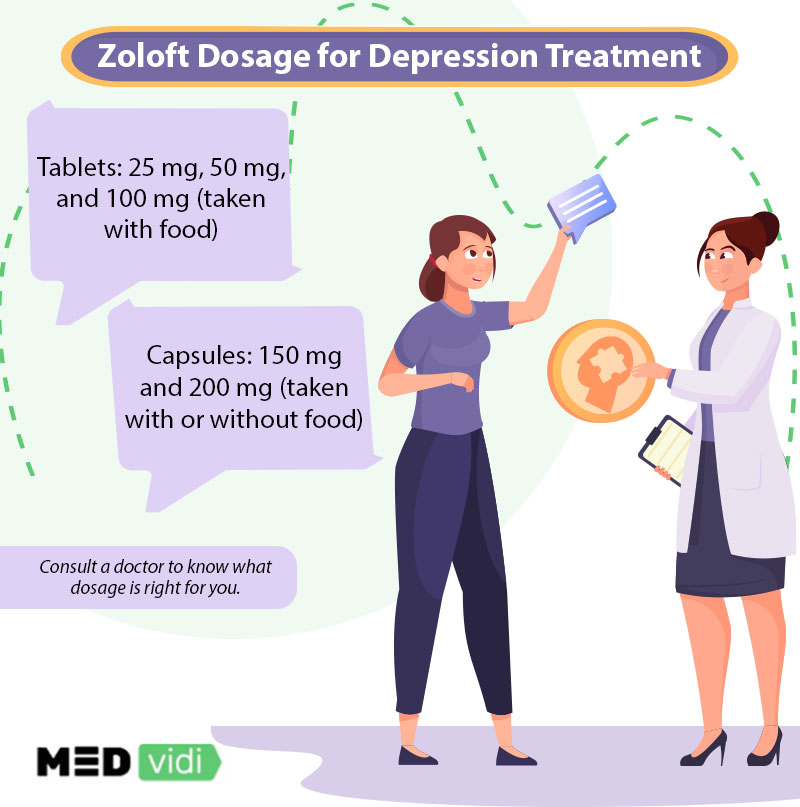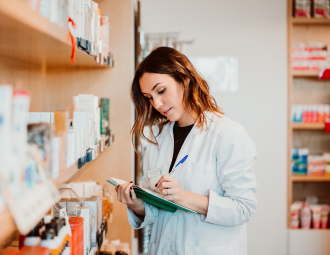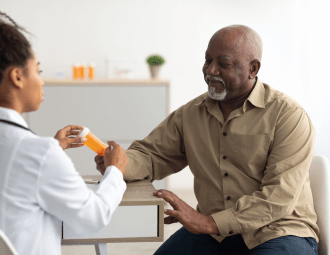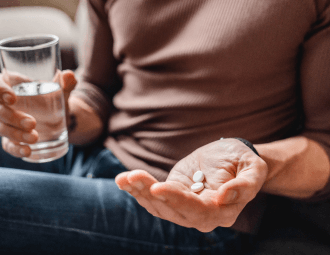According to the WHO,
When it comes to treatment options, psychotherapy and medications are used to help manage the symptoms. Zoloft is one of the best medications for depression, as it will work on the brain to cure the condition. In this post, let’s learn more about it.
Consult a doctor to know if you need medications or therapy to overcome depression.
What is Zoloft Used for?
Zoloft is a medicine used for the treatment of major depressive disorder (MDD). It can also treat other psychological conditions, such as:
- Social anxiety disorder (SAD)
- Panic disorder (PD)
- Premenstrual dysphoric disorder (PMDD)
- Post-traumatic stress disorder (PTSD)
- Obsessive-compulsive disorder (OCD)
Zoloft Generic
Sertraline is the generic form of Zoloft. It is an alternative selective serotonin reuptake inhibitor that increases the brain’s serotonin quantity. Serotonin helps a person conduct normal daily activities, improving learning and memory, and enhancing mood and sleep.
Sertraline is safe and has the same benefits as Zoloft to the user. Before making the switch to Sertraline, patients should consult their doctor to review their condition. That ensures they get the proper medical prescription.
How Does Zoloft Work for Depression
Zoloft helps the brain increase serotonin levels. Serotonin is a chemical message that sends signals from one nerve cell to another nerve cell, a gland, or a muscle cell.
Neurons in the brain usually absorb serotonin quickly, meaning patients suffering from anxiety and depression may have low levels of this hormone. Zoloft functions by blocking the absorption of serotonin by neurons in the brain, causing its build-up between two neurons. That allows the chemical to send more messages between the neurons, which boosts a patient’s mood.
A doctor will choose the most suitable depression medicine online from a variety of options.
Zoloft Dosage for Depression and Intake Recommendations
Zoloft is available in tablet and oral form. Tablets come in doses of 25 mg, 50 mg, and 100 mg; capsules are available in generic form in 150 mg and 200 mg, while the oral solution is 20 mg/mL.
Patients taking Zoloft for depression should follow these recommendations:
- Taking the 25 mg, 50 mg, and 100 mg tablets with food (mandatory)
- Taking 150 mg and 200 mg with or without food
- Swallowing the capsules without crushing them
Take the liquid drug as follows:
- Mix it with another liquid before using it
- Use the dropper provided to measure the dose (don’t use a teaspoon)
- Mix the dose with 120 ml (4 ounces) of ginger ale, lemonade, water, orange juice, or lemon-lime soda (strictly stick to any of these)
- Drink the mixture immediately
The mixture may look cloudy, but it’s normal. Patients should only prepare the right amount of mixture they will ingest at a go. They shouldn’t prepare extra for storage to drink later.

What is the Maximum Dose of Zoloft for Depression?
The average dosing of Zoloft is 25mg per day. However, some patients might not respond to that dosage, and a doctor may prescribe higher doses of Zoloft for depression for a better effect. A doctor can also increase the dosage depending on the patient’s tolerability. The maximum daily dosage is 200 mg.
Patients who miss their medication should not take a double dose to replace the missed one. However, if it is not more than eight hours late, they can proceed to take it. It’s not advisable to skip doses as one can start experiencing symptoms such as:
- Dizziness
- Nausea
- Insomnia
- Body aches
- Excessive tiredness
These symptoms should go away as soon as the patient resumes taking the medication consistently.
Stick to the recommendations provided by your doctor. Get comprehensive support at MEDvidi.
Zoloft Side Effects
Zoloft may lead to developing certain side effects. They may immediately occur after one starts their treatment or in one to two weeks. Some of the side effects of Zoloft are:
- Nausea
- Diarrhea
- Dizziness
- Fatigue
- Headache
- Loss of appetite
- Sleep problems
The effects might be severe or mild in different patients. A patient should not cease using the medication before consulting a doctor, as some conditions can deteriorate if one stops using it. Do not operate heavy machinery, drink alcohol, or take illicit drugs while on Zoloft.
Final Thoughts
Depression is manageable when treated with the proper medication, such as Zoloft. Taking the prescribed medication correctly and consistently increases the chances of healing fast.
When a doctor prescribes Zoloft for anxiety and depression, they will warn you about possible side effects that may vary from one patient to another. Side effects may not necessarily call for action, as they will get better with time. However, consult a doctor if symptoms persist.














